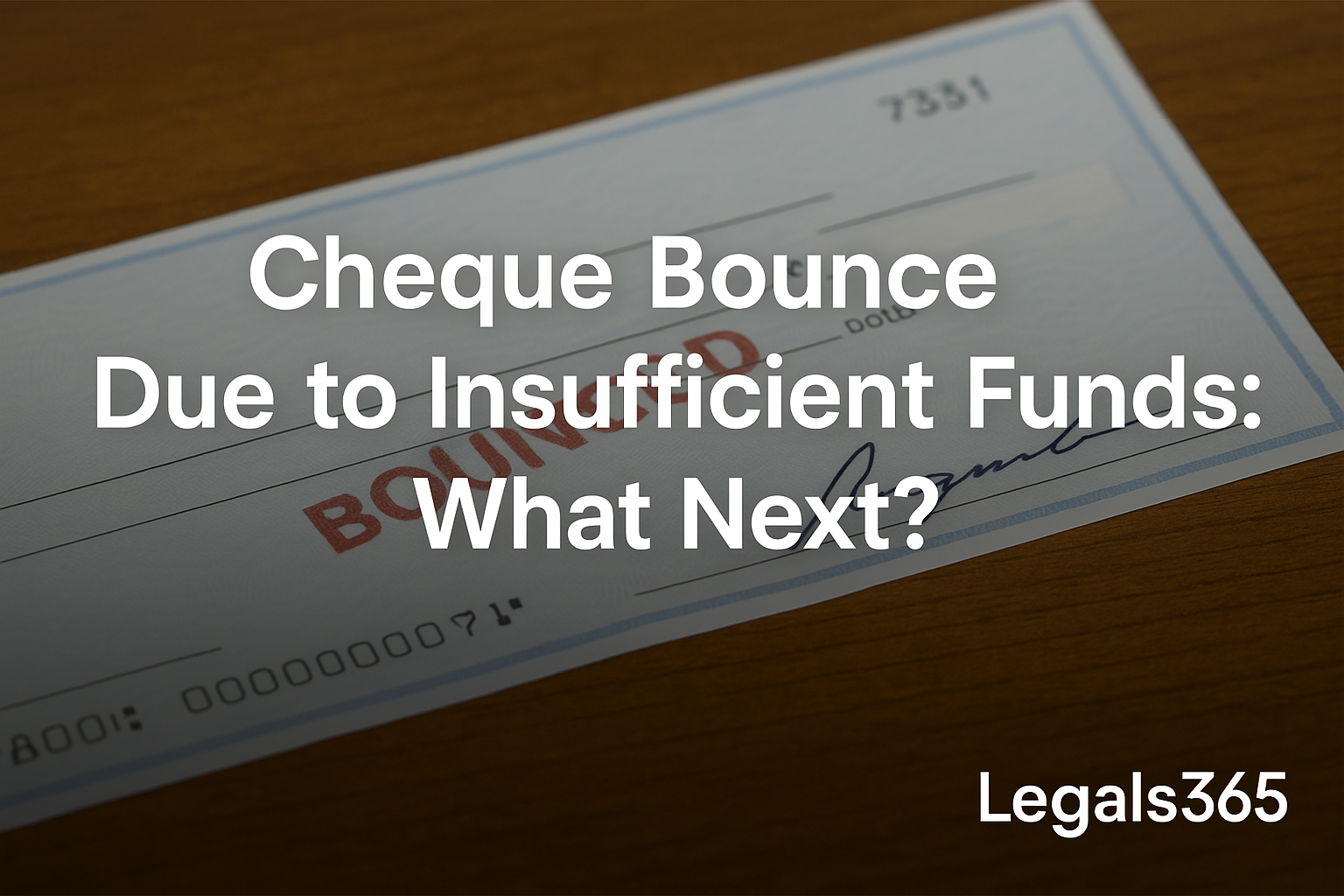
Cheque Bounced Due to Insufficient Funds? Here’s What to Do
Introduction
Ever received or issued a cheque, only to find out it’s been dishonoured by the bank due to insufficient funds? You’re not alone. A cheque bounce is not only embarrassing and inconvenient but also carries serious legal implications—especially in India.
Under Section 138 of the Negotiable Instruments Act, 1881, issuing a cheque that gets dishonoured can lead to criminal charges. Whether you’re the payee trying to recover your money or the issuer trying to defend yourself, it’s essential to understand the legal framework, available remedies, and best next steps. This article explains all that—and how Legals365 can step in to support you.
What Is a Cheque Bounce?
A cheque bounce occurs when a cheque presented to the bank for payment is returned unpaid. There are multiple reasons for this:
- Insufficient funds in the drawer’s account
- Mismatched signatures
- Expired cheque (cheques are typically valid for 3 months)
- Overwriting or damaged cheques
The most serious and commonly prosecuted reason, however, is bouncing due to insufficient funds.
Legal Implications Under Section 138 of the NI Act
According to Section 138 of the Negotiable Instruments Act, bouncing a cheque due to insufficient balance is a criminal offence—provided the cheque was issued to repay a legally enforceable debt or liability.
What Happens Next?
- Cheque Return Memo: When the cheque is bounced, the bank issues a memo citing the reason.
- Legal Notice: The payee must send a legal notice to the issuer within 30 days of receiving the memo.
- 15-Day Payment Window: The issuer then has 15 days to make the payment.
- Filing a Complaint: If the drawer fails to pay, the payee can file a complaint in the Magistrate’s Court within 30 days of the expiry of the notice period.
- Trial & Penalty: If convicted, the drawer can face:
- Up to 2 years imprisonment
- A fine of up to double the cheque amount
- Or both
Real-Life Scenario
Imagine Priya, a freelance graphic designer, receives a cheque of Rs. 85,000 from a client. The cheque bounces due to insufficient funds. She acts fast—sends a legal notice, receives no response, and files a complaint. Through her advocate on Legals365, Priya wins the case in court. Her client is ordered to repay the amount with penalties.
Legal Remedies Available to the Payee
✔ Send a Timely Legal Notice
Never delay. You must send a legal notice within 30 days of the bounce.
✔ Criminal Complaint
If no payment is made within 15 days of the notice, file a criminal complaint under Section 138.
✔ File a Civil Suit for Recovery
Alongside a criminal case, you can file a civil suit to recover money, interest, and legal costs.
Legal Rights of the Drawer (Issuer)
If you’re the one who issued the bounced cheque, here are some valid defences:
- The cheque wasn’t issued against a legally enforceable debt
- The cheque was given as a security
- You paid the amount within 15 days of receiving the notice
- The complaint was filed beyond the prescribed timelines
Still, to avoid legal complications, it’s always advisable to resolve disputes early—either by paying the amount or negotiating through your advocate.
How to Prevent Cheque Bounce Situations
🔹 For Drawers:
- Ensure your bank account has sufficient balance
- Avoid issuing post-dated cheques unless confident about funds
- Cross-check the cheque for errors
🔹 For Payees:
- Always deposit the cheque within 3 months
- Keep records of all transactions
- Save the cheque return memo and legal notice receipts
Why Choose Legals365 for Cheque Bounce Matters?
Legals365 offers quick, affordable, and professional legal support for cheque dishonour cases. Here’s how we help:
- Legal Notice Drafting and sending within timelines
- Filing Section 138 Cases in appropriate jurisdiction
- Court Representation through experienced advocates
- Dual Action Support: civil & criminal proceedings
- Nationwide Advocate Network
- Online Consultation & Document Uploads
We simplify the legal process, ensure timely updates, and provide cost-effective legal packages.
Final Thoughts
A cheque bounce due to insufficient funds can trigger serious legal consequences for the issuer and stress for the payee. It’s essential to act promptly and within the legal framework.
If you’re facing such a situation—either as a complainant or as a defendant—seek professional legal advice immediately. Legals365 and Online Noida is here to support you at every step.
📞 Need help with a bounced cheque?
Reach out to Legals365 and get the expert legal advice you deserve.
Hashtags
#ChequeBounceLaw #Section138NIAct #InsufficientFundsIssue #ChequeDishonourHelp #LegalHelpIndia #ConsumerProtectionLaw #ChequeReturnCase #Legals365Support #BouncedChequeLegalAdvice #ChequeCaseFiling #LegalNoticeDrafting #TrustedLegalService #CriminalChequeOffence #OnlineLegalHelpIndia #TopChequeBounceAdvocates #Legals365 #OnlineNoida
